Politics
Rebirth of northernisation policy
Published
10 years agoon
By
Olu Emmanuel
• As Buhari battles incremental legislative tyranny
By SUNDAY ODIBASHI
THE controversies over the distortion of the 2016 budget by the National Assembly show clear indicators of resurgence of Northernisation policy, an ancien regime that threatened the country’s fundamental basics of nation building and articulation of national interest in the 1960s into the 1970s. The lawmakers craftily manipulated the budget to promote the peculiar interests of the North, relegating the interests of the South to secondary importance contrary to the change agenda of President Muhammadu Buhari and the All Progressives Congress (APC).
This became pellucid in the explanations of Abdulmumin Jibrin, Chairman, Committee on Appropriations in the House of Representatives, on the unilateral alterations of the budget of the Ministry of Transport by the legislature, sacrificing the Lagos-Calabar rail line project for Lagos-Kano rail line controversy, inclusion of new items in the budget.
That singular action on the rail line budget reminds Nigerians of the perennial crisis of North/South dichotomy in the mainstream body politic. Accordingly, a new battle line seems to have been drawn between northern and southern lawmakers in the two Chambers of the National Assembly.
However, President Muhammadu Buhari was sensitive to the alterations in the 2016 budget; took pro-active decision in withholding his assent until details of the Appropriation Act are made available for scrutiny.
Some stakeholders in the Nigerian project are of the view that the inherent northernisation policy injected into the budget could dent the image of President Buhari who was marketed in the electioneering campaign on the values of ethics, integrity and morality. They added that “the change slogan would also be misconstrued.” They commended President Buhari for not aligning himself with the divisive ethnic politics being reinvented into the budget by the National Assembly.
It will be recalled that while deliberating on the committee report on the budget, Deputy President of the Senate, Ike Ekweremadu, admonished inter alia: “If there were mistakes, it will not be good for us to allow it go. We should have find ways to fill it. You cannot blame the executive.”
ALSO SEE: Buhari’s popularity sinks further – Survey
The Deputy Senate President had given the warning after Senator Danjuma Goje, Chairman, Senate Committee on Appropriations, admitted, among others: “The budget is full of controversies and we don’t want to add to it.”
The tone of the debate showed that the lawmakers did not do thorough job on the budget. Perhaps, the legislators were scared of public outburst on the delay of the budget which was sent to the National Assembly in December 2015 by the President and had to pass the appropriation bill hurriedly to shift attention to the President. .
The President of the Senate, Dr. Abubakar Bukola Saraki, had articulated that the budget reflected efficient and equitable allocation of resources.
The major sensitive budget controversy is the insinuation of N80 billion allocated for the Lagos-Calabar rail project said to be unilaterally reallocated to Lagos-Kano rail line and other projects sited in the North.
However, Abdulmumin Jibrin had protested that President Buhari did not make any provision for the Lagos-Calabar rail project in the budget he submitted to the National Assembly, arguing: “so, the money could not have been diverted to other projects.”
Abdulmumin Jibrin, Chairman, House Committee on Appropriations, had contended:
“Lagos-Calabar Railway line was never captured in the budget that was sent by the Executive;” asking, “How, then, could it have been removed by National Assembly.” He insisted, “How could National Assembly have removed what was not there,” noting that the country is being misled.
ALSO SEE: Buhari to crack the budget pills
Jibrin considered the public blame on National Assembly unfortunate, saying that all the headaches and controversies of the 2016 budget did not emanate from the National Assembly. Jibrin explained that the budget of the Ministry of Transportation was overshot by N54 billion, insisting that N54 billion was lying there without being allocated.
“National Assembly has a responsibility and here it did the right thing. What National Assembly did with the N54 billion; we added N39.7 billion to the Lagos-Kano Rail project.
This will help complete the project once and for all. We also allocated N10 billion of this sum to the airport’s navigation and security apparatus…We allocated the balance to Baro Ports for its completion and equipping. Baro Port is strategic to our economic development,” Jibrin narrated.
The Chairman, House Committee on Appropriations, also revealed that the budget of the Ministry of Health was the most controversial. The Minister of Health, Jubrin said, came to deny the document that was presented to the National Assembly by the Executive for the second time.
“We also allocated funding for rural solar street lights, vocational centres, cottage industries etc. On this one, there is no going back,” Jubrin had declared.
The Chairman, House Committee on Appropriations, lamented that about 95 per cent of the input of National Assembly which would have given life to the policy thrust of the President were discarded by the Executive.
“Some of these inputs include; Special Intervention for the Solid Mineral Sector; Special Intervention for Rural Agriculture, Payment of Pension Arrears, Rural Community Light project, The Rural Community Light project to light up 100 communities across the 774 Local Governments, ” Jubrin had highlighted.
“We had Special Programmes for Women Empowerment and the payment of debt owed local contractors. We also suggested N100 billion be taken out of N500 billion set aside as Special Intervention Fund; that N50 billion be set aside as special bursary for students of tertiary institutions and another N50 billion for special training on Entrepreneurship for students of tertiary institutions pre-graduation. These were our inputs,” the House Appropriations Committee Chairman, had narrated.
National Daily inquiry revealed that the federal lawmakers may have gone beyond the limit of appropriation powers, according to the basic principles of systematic financial planning procedure that sums up the budgetary system.
Universally, legislative power of appropriation simply implies authorization of the executive to spend budget estimates or proposal as passed into law. Allocation and allotment of funds are exclusive responsibilities of the executive.
ALSO: Buhari in the trauma of change
Findings show that in some governmental systems, the legislature may revise the executive budget in any manner it wishes. This is, however, amenable to systems where there is fusion of powers, essentially, the parliamentary system, where the cabinet is formed from the legislature.
It has also been indicated that in most other systems, the legislature may only delete or reduce budgetary items; they may not add new items or increase amounts. If the legislature decides to increase appropriations, it must provide for the raising of a corresponding amount of additional revenue by levying taxes.
This latter perspective prevails in the presidential system where there is separation of powers.
It has been argued that legislative interference places budget preparation in the hands of those who are neither familiar with the needs of the departments nor responsible for budget administration.
Generally, the President has the responsibility of proposing revenue generation (taxes) and allocation the proceeds for the best interests of the government and the people as a whole. Accordingly, the various unilateral inputs by National Assembly members, as highlighted by the Chairman, House Committee on Appropriations, presuppose limiting the discretions of the executive on budgetary allocations or constraining the administrators of the budget. This is synonymous with legislative tyranny, usurpation of the powers of the executive, in a presidential system. It is being argued that “limiting the discretion of the administrators introduces rigidity into the financial system and in this way, results in inefficiencies.” This is precipice to chaotic financial administration in the fiscal year. The overarching basic principle requires that the lawmakers on identifying shortcomings in the budget proposal, after official presentation, refer it back to the executive for adjustment and re-presentation to the Assembly. The communications are usually through “diplomatic inter-governmental relations” or bureaucratic protocols”, most time, without public knowledge.
This is so because ministry, department and agency (MDAs) heads are provided several months prior to the beginning of the fiscal year, with forms by the budget office and directed to prepare their request for funds, with supporting data of implementation details.
The insistence of the National Assembly that President Buhari should sign the budget, as passed, then, sends a supplementary budget is untenable in budgeting process.
Inquiry showed that after appropriations, the executive takes absolute responsibility for budget implementation. In the budget execution process, if the funds became exhausted before the end of the fiscal year, it was customary to request the legislature to make supplementary, or “deficiency” appropriations. Accordingly, supplementary budget is not meant for adjustment of budget proposal but to augment financial shortage before the end of the fiscal year.
ALSO SEE: How NASS padded Buhari’s budget
The lingering budget impasse paints a graphic picture of a legislature intimidating the president into the absurd.
The 2016 fiscal year is still taking off; invariably, there is still window for necessary adjustments. It is apposite that as the President has listed the grey areas in the budget, members of the National Assembly need give it urgent consideration and proper appropriations. The country’s economy is bleeding.
The lawmakers need to reason with Right Honourable Yakubu Dogara, Speaker House of Representatives, who has said that the National Assembly may review the budget.
You may like


Police take over APC secretariat in Benue
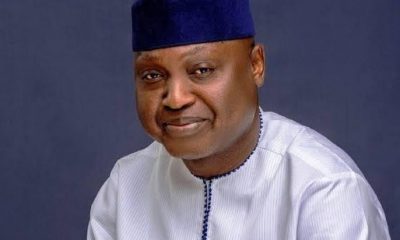

You’ll govern Ekiti for eight years, Fayose tells Oyebanji
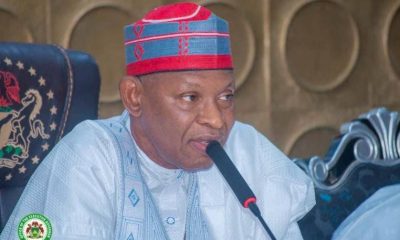

Tribunal judgment replay of 2019 script, says NNPP
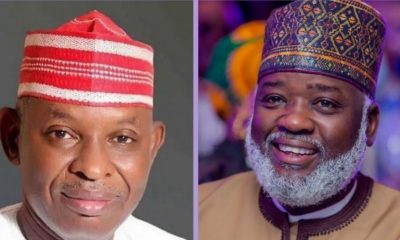

Tribunal set to deliver judgement on Kano State iconic governorship election chaos
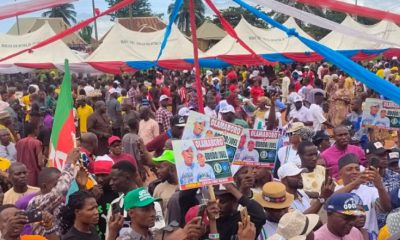

Thousands troop out in Kogi to support APC guber candidate, Ododo


President Tinubu Is Determined To Lift 133 Million Nigerians Out Of Poverty – Betta Edu
Trending

 Entertainment7 days ago
Entertainment7 days agoSinger Simi faces backlash after TikToker admits to false rape allegation

 Entertainment4 days ago
Entertainment4 days agoSimi addresses resurfaced 2012 tweets amid online backlash

 Comments and Issues6 days ago
Comments and Issues6 days agoNigeria’s Declining Oil Output and Soaring Foreign Portfolio Investment Inflow

 Business7 days ago
Business7 days agoPENGASSAN warns Tinubu’s executive order on oil revenues could jeopardise 4,000 jobs

 Comments and Issues6 days ago
Comments and Issues6 days agoEx-prince Andrew’s arrest, lessons for Nigeria

 Health1 week ago
Health1 week agoNanoplastics may disrupt brain cells that control puberty, fertility, study finds

 Health5 days ago
Health5 days agoSCFN, LUTH introduce bone marrow transplants as curative treatment for sickle cell
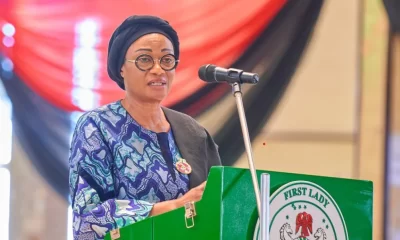
 Editorial Opinion1 week ago
Editorial Opinion1 week agoFirst Lady, Senator Oluremi Tinubu: A call to purpose beyond symbolism

